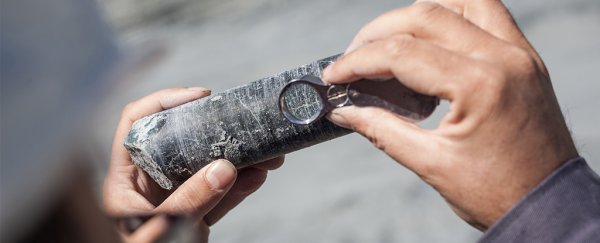Earlier this year, researchers found a deposit of rare-earth minerals off the coast of Japan that could supply the world for centuries, according to a study.
The study, published in the journal Nature in April 2018, says the deposit contains 16 million tons of the valuable metals.
Rare-earth minerals are used in everything from smartphone batteries to electric vehicles. By definition, these minerals contain one or more of 17 metallic rare-earth elements (for those familiar with the periodic table, those are on the second row from the bottom).
These elements are actually plentiful in layers of the Earth's crust, but are typically widely dispersed. Because of that, it is rare to find any substantial amount of the elements clumped together as extractable minerals, according to the USGS.
Currently, there are only a few economically viable areas where they can be mined and they're generally expensive to extract.
China has tightly controlled much of the world's supply of these minerals for decades. That has forced Japan – a major electronics manufacturer – to rely on prices dictated by their neighbour.
A new finding that could change the global economy
The recently discovered deposit is enough to "supply these metals on a semi-infinite basis to the world," the study's authors wrote in the paper.
There's enough yttrium to meet the global demand for 780 years, dysprosium for 730 years, europium for 620 years, and terbium for 420 years.
The cache lies off of Minamitori Island, about 1,150 miles (1,850 km) southeast of Tokyo. It's within Japan's exclusive economic zone, so the island nation has the sole rights to the resources there.
"This is a game changer for Japan," Jack Lifton, a founding principal of a market-research firm called Technology Metals Research, told The Wall Street Journal.
"The race to develop these resources is well underway."
Japan started seeking its own rare-earth mineral deposits after China withheld shipments of the substances amid a dispute over islands that both countries claim as their own, Reuters reported in 2014.
Previously, China reduced its export quotas of rare earth minerals in 2010, pushing prices up as much as 10 percent, The Journal reports. China was forced to start exporting more of the minerals again after the dispute was taken up at the World Trade Organisation.
Rare-earth minerals can be formed by volcanic activity, but many of the minerals on our planet were formed initially by supernova explosions before Earth came into existence.
When Earth was formed, the minerals were incorporated into the deepest portions of the planet's mantle, a layer of rock beneath the crust.
As tectonic activity has moved portions of the mantle around, rare earth minerals have found their way closer to the surface.
The process of weathering - in which rocks break down into sediment over millions of years - spread these rare minerals all over the planet.
The only thing holding Japan back from using its newly found deposit to dominate the global market for rare-earth minerals is the challenge involved in extracting them.
The process is expensive, so more research needs to be done to determine the cheapest methods, Yutaro Takaya, the study's lead author, told The Journal.
Rare-earth minerals are likely to remain part the backbone of some the fastest-growing sectors of the global tech economy.
Japan now has the opportunity to control a huge chunk of the global supply, forcing countries that manufacture electronics, like China and the US, to purchase the minerals on Japan's terms.
A version of this article was first published in April 2018.
This article was originally published by Business Insider.
More from Business Insider:
